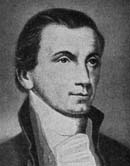
Return to U.S. Presidency - Index Page.
Return to U.S. Presidents' Biographies Page.
Born: 4/28/1758
Birthplace: Westmoreland County, Va.
James Monroe was born on April 28, 1758, in Westmoreland County, Va. A William and Mary graduate, he served in the army during the first years of the Revolution and was wounded at Trenton. He then entered Virginia politics and later national politics under the sponsorship of Jefferson. In 1786, he married Elizabeth (Eliza) Kortright.
Fearing centralization, Monroe opposed the adoption of the Constitution and, as senator
In 1808, Monroe flirted with the radical wing of the Republican Party, which opposed Madison's candidacy; but the presidential boom came to naught and, after a brief term as governor of Virginia in 1811, Monroe accepted Madison's offer to become Secretary of State. During the War of 1812, he vainly sought a field command and instead served as Secretary of War from September 1814 to March 1815.
Elected president in 1816 over the Federalist Rufus King, and re-elected without opposition in 1820, Monroe, the last of the Virginia dynasty, pursued the course of systematic tranquilization that won for his administrations the name “the era of good feeling.” He continued Madison's surrender to the Hamiltonian domestic program, signed the Missouri Compromise, acquired Florida, and with the able assistance of his Secretary of State, John Quincy Adams, promulgated the Monroe Doctrine in 1823, declaring against foreign colonization or intervention in the Americas. He died in New York City on July 4, 1831, the third president to die on the anniversary of Independence.
Died: 7/4/1831


